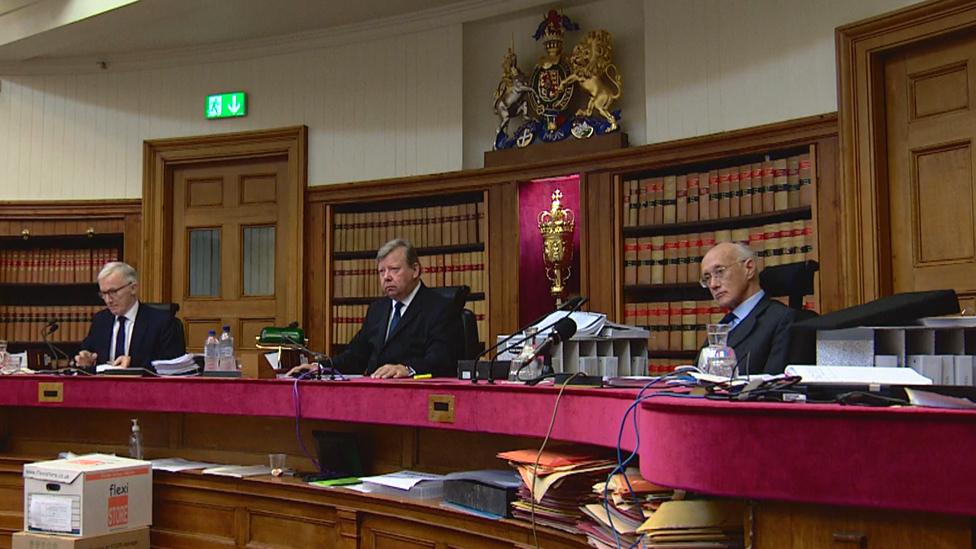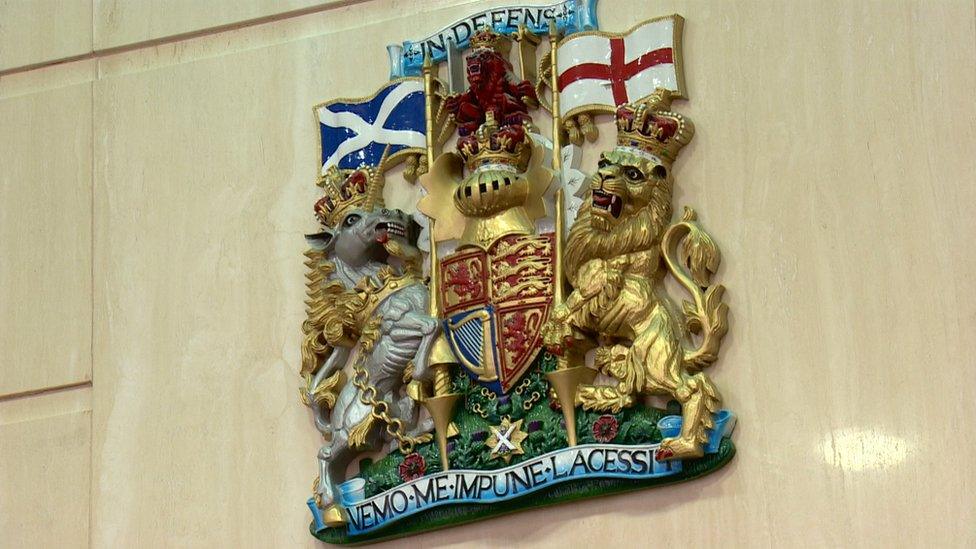Why the Scottish court ruling on proroguing Parliament is significant
- Published

The three judges ruled that it was illegal to suspend parliament
The ruling by Scotland's highest civil court that it was illegal to shut the UK Parliament is - in the true sense of the word - extraordinary.
Normally courts do not intervene in the decisions of the government, using the principle of a "margin of appreciation," which gives ministers more leeway under the law than that of ordinary people or organisations.
So the fact that all three judges at the Court of Session have - albeit by different routes - arrived at the decision that they can intervene is highly significant.
Stephen Tierney, professor of Constitutional Theory at Edinburgh University, believed the significance of this judgement would be felt not only in the short term but in the longer term also.
He explained: "The normal view of the courts is that it would not be appropriate to rule on the exercise of prerogative power.
"So the long-term significance of this ruling is very important."
"The lower court had said the actions of the executive were 'non-justiciable' - meaning they were not to be examined by judges.
"But this decision indicates the courts are more prepared than many people had expected to intervene in government actions."
The case was brought to the Court of Session by a cross-party group of 75 parliamentarians, who argued the PM had exceeded his powers.
Lord Doherty heard both sides of the argument and ruled last week that the issue was for the judgement of politicians and voters, and not the courts.
But when the case was taken to three appeal judges, they saw it differently.
They concluded that the PM was attempting to prevent Parliament holding the government to account, ahead of Brexit.
Jim Cormack, a constitutional law expert at lawyers Pinsent Mason in Edinburgh said: "The judges have decided this was a clear case in which the government had stepped outside of the normal room for manoeuvre it is allowed by the courts, when it gave its advice to HM the Queen.
He added: "This decision of the Scottish appeal court radically changes the legal landscape ahead of an expected hearing before the United Kingdom Supreme Court next week."
Why did Scotland's judges get involved?
This case was brought in a Scottish court because at the time the High Court in England was on holiday.
But that does not diminish the effect of the ruling, as the case was against the actions of the Westminister government which, within the devolution settlement, affects the whole of the UK.
So the ruling in Edinburgh is binding on the UK government - although this is by no means the end of the legal battle since the case will now be appealed to the UK Supreme Court which will make a definitive decision.
It is also likely to hear arguments arising from decisions in similar cases brought at the High Court in London under English law and the Northern Ireland High Court.
What does proroguing parliament mean?
Although proroguing parliament - or suspending it from sitting - is not unheard of, this time it was seen as different.
Parliamentary sessions normally last a year, but the current one has been going on for more than two years - ever since the June 2017 election.
When Parliament is prorogued, no debates and votes are held - and most laws that haven't completed their passage through Parliament die a death.
This is different to "dissolving" Parliament - where all MPs give up their seats to campaign in a general election.
What will happen next, and whether MPs head back to Westminster, will be fought out in both the political and legal arenas.

The argument for why it was legal to prorogue
David Johnston QC tells the Court of Session prorogation is a political and not a legal matter
The argument for why it was not legal to prorogue
Aidan O'Neill QC says the court and petitioners were being actively misled over prorogation plans
Court of Session case: How we got here

22 July - It emerges that a cross-party group of MPs and peers plans legal action to prevent Parliament being "closed down" in the run-up to Brexit
13 August - The group go to the Court of Session in Edinburgh and Lord Doherty agrees to hear arguments from both sides in September
28 August - The parliamentarians seek an interim interdict to block Boris Johnson's move to prorogue Parliament
29 August - Lord Doherty hears four hours of argument from both sides
30 August - The judge refuses an interim interdict but brings the full hearing forward to 3 September
3 September - The court hears that Prime Minister Boris Johnson approved the Parliament shutdown two weeks before it was publicly declared
4 September - Lord Doherty rejects a bid to have the shut down declared illegal. The campaigners say they will appeal
5 September - Three judges at the Court of Session in Edinburgh begin to hear an appeal on Lord Doherty's ruling
11 September - The panel, led by Lord Carloway, says Boris Johnson's suspension of the UK Parliament is unlawful